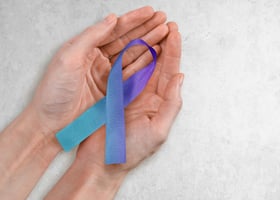Study Finds Increased Suicide Risk in Spouses of People With Cancer

Spouses of people who have cancer have a higher risk of suicide attempt or death by suicide, especially in the first year after the spouse’s diagnosis, a study in JAMA Oncology has found.
Qianwei Liu, M.D., Ph.D., of Southern Medical University in Guangzhou, China, and colleagues compared data from 409,338 spouses of Danish patients diagnosed with cancer with that of 2,046,682 matched individuals whose spouses did not have a cancer diagnosis (the control group). The researchers drew the data from Danish national health registers and the Danish Causes of Death Register from 1986 through 2016. The individuals were followed until they had a first suicide attempt, died by suicide, died by other causes, emigrated, or December 31, 2016—whichever came first. If the spouse of an individual originally in the control group was diagnosed with cancer during follow-up, the individual was shifted to the group whose spouses had cancer.
Compared with individuals in the control group, individuals whose spouses had a cancer diagnosis had a 1.47-fold increased risk of dying by suicide and a 1.28-fold increased risk of having a suicide attempt during follow-up. During the first year after diagnosis, individuals whose spouses had cancer had a 2.56-fold increased risk of dying by suicide and a 1.45-fold increased risk of having a suicide attempt, and their risk of dying by suicide remained elevated throughout follow-up.
“The finding of the highest risk increase of suicide attempt and suicide death during the first year after cancer diagnosis corroborates our study group’s previous findings of the greatest risk increase of psychiatric disorders during the first year after cancer diagnosis among both patients with cancer and their spouses,” Liu and colleagues wrote.
The risk of having a suicide attempt or dying by suicide was higher in individuals with spouses whose cancer was diagnosed at an advanced or unknown stage compared with those whose spouses were diagnosed at an early stage. The researchers noted that this may be attributable to individuals experiencing a greater burden of the disease or a greater fear of the spouse dying.
“A greater burden of the disease may contribute to a higher level of psychological distress of the patient with cancer and a greater need of support and caregiving from their loved ones, particularly the spouse,” the researchers wrote.
For related information, see the APA blog post “‘Nowhere to Turn’: COVID-19 and Caregiver Stress.”
(Image: Getty Images/iStock/Yuto photographer)
Don't miss out! To learn about newly posted articles in Psychiatric News, please sign up here.





